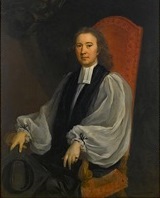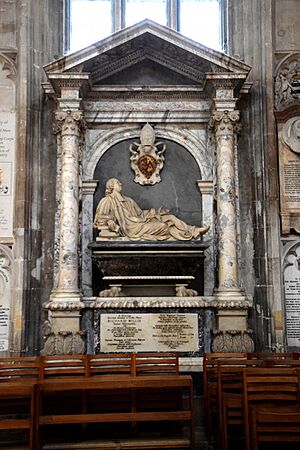Richard Willis (bishop) facts for kids
Richard Willis (born 1663, died 1734) was an important English bishop. He held several high positions in the Church of England during his lifetime.
Contents
Early Life and Education
Richard Willis was born in a place called Ribbesford in Worcestershire, England. His father worked as a tanner, which means he prepared animal hides to make leather.
Willis went to Bewdley Grammar School. After that, he studied at Wadham College, Oxford, starting in 1684. He earned his first degree, a BA, in 1688. Later, he became a Fellow at All Souls College, Oxford. This meant he was a senior member of the college, often involved in teaching or research.
Church Career
Willis began his church career as a curate in Cheshunt. A curate is a priest who helps another priest in a parish. In 1692, he became a lecturer at St Clement, Strand in London. He became well-known for his excellent preaching.
In 1694, he traveled to the Netherlands as a chaplain to King William III. A chaplain is a priest who serves a specific group or person, like a king.
Becoming a Bishop
Richard Willis rose through the ranks of the church:
- In 1701, he became the Dean of Lincoln. A dean is a senior priest in charge of a cathedral.
- In 1714, he was made Bishop of Gloucester. A bishop is a high-ranking church leader who oversees a group of churches in a specific area.
- In 1721, he became the Bishop of Salisbury. At the same time, he was also made the Chancellor of the Order of the Garter. This is a very old and important order of knighthood in Britain.
- In 1723, he moved again to become the Bishop of Winchester. This was a very important position. He also became the Clerk of the Closet for the King, which meant he advised the King on religious matters.
- From 1718 to 1723, Willis served as the Lord High Almoner. This role involved distributing money to the poor on behalf of the King.
Important Contributions
Willis was one of the main people who helped start the Society for Promoting Christian Knowledge (SPCK). This group works to spread Christian education and literature.
He also gave the first annual sermon for the Society for the Propagation of the Gospel in Foreign Parts (SPG) in 1702. This group aimed to spread Christianity in other parts of the world. Willis had ideas about how the Anglican Church could work with trade and new settlements to help its missionary work.
Public Speaking and Debates
Richard Willis was known for his strong opinions. He spoke out against certain ideas that he disagreed with. For example, he criticized deism, which was a belief that God created the world but does not interfere with it.
In 1705, he gave an important sermon at St Paul's Cathedral. This sermon was to celebrate the victories of the Duke of Marlborough in the War of the Spanish Succession. The sermon was a big event and was later published. It also caused some debate among people at the time.
Later Life and Legacy
Willis was involved in politics and supported the Whig political group.
He passed away on August 10, 1734, at the age of 71. There is a large memorial built in his honor inside Winchester Cathedral. This memorial was sculpted by Henry Cheere.
 | Shirley Ann Jackson |
 | Garett Morgan |
 | J. Ernest Wilkins Jr. |
 | Elijah McCoy |



